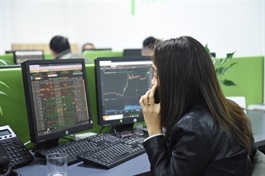Market liquidity falls to two-month low, concerning investors
Market liquidity falls to two-month low, concerning investors
Investors are becoming increasingly concerned and hesitant in making investment decisions due to the current low level of market liquidity, which is at its lowest point in the past two months.

An investor watches stock indices on a computer screen. Both domestic and foreign investors are exhibiting hesitancy in investing, with foreign investors gradually withdrawing capital over an extended period. — VNA/VNS Photo |
The average liquidity level in the market has declined to around VNĐ13 trillion, compared to the average transaction values of VNĐ16.56 trillion in November, VNĐ14.28 trillion in October, and VNĐ22.12 trillion in September.
During the trading session on December 21, the matched volume on HoSE reached nearly 455 million shares, experiencing a significant decrease compared to the previous average level and marking the lowest level in the past two months since October 24, 2023. The matched order value on HoSE amounted to approximately VNĐ9.7 trillion, marking the second consecutive session with liquidity dropping below VNĐ10 trillion.
Both domestic and foreign investors are exhibiting hesitancy in investing, with foreign investors gradually withdrawing capital over an extended period. The cumulative net selling value on HoSE by foreign investors has exceeded VNĐ24.2 trillion since the beginning of 2023.
On the other hand, the price of SJC gold bars in the gold market continues to rise, reaching record prices and is expected to keep increasing. Some investors believe that money is shifting from stocks to gold amid this context. However, financial experts note that the gold market has a significantly smaller scale in terms of transaction value compared to stocks. The prioritisation of gold over stocks by some individuals does not necessarily indicate a complete conversion of cash flow from stocks to gold.
Analysts attribute the decline in liquidity to the market's continuous fluctuations within a narrow range. The struggle of the index to decisively surpass the familiar mark of 1,100 points has contributed to a sense of investor pessimism.
Furthermore, the market's frequent pattern of minor recoveries followed by further declines has resulted in losses for many investors. The repetitive "bull trap" occurrences have diminished interest in chasing cash flow.
Regarding the return of money into the market, analysts view the shrinking cash flow as a typical phenomenon towards the end of the year due to the psychological effect of the approaching holidays. This period often witnesses a profit-taking mentality among short-term investors to secure profits before the Lunar New Year festivities.
Moreover, the weak fluctuations in stock prices indicate limited selling pressure. The low liquidity effect becomes concerning only if stock prices experience significant declines, indicating a clear shortage of buyers.
Investors are currently adopting a strategy of waiting for sellers' impatience to lower prices before actively engaging in buying at lower prices. If sellers continue to hold firm without selling at discounted rates, the supply and demand dynamics cannot align, resulting in low liquidity that can be considered normal, as said by Nguyễn Thế Minh, Director of Yuanta Vietnam Securities.
Many opinions suggest that cash flow is temporarily "waiting for time." It is customary for the stock market to experience a gloomy period at the end of the year, followed by excitement at the beginning of the new year. Therefore, it is expected that after the Lunar New Year, stocks will once again witness abundant cash flow.
Huỳnh Hoàng Phương, Director of FIDT Analysis, explained that investors were awaiting clearer signals regarding economic recovery expectations and a gradual decrease in foreign selling pressure before taking action.
Therefore, Phương suggested that in the near future, if the selling pressure from foreign investors subsides and the stories surrounding the fourth-quarter business results of companies unfold, it is likely that cash flows will strengthen in future trading.
In the immediate future, at the end of 2023, the most anticipated development is whether the new KRX system will be operational as planned. This new system is expected to play a crucial role in helping the market meet the criteria for upgrading from marginal to emerging status. It is also anticipated to be a key factor in attracting foreign investors in the future, Phương said.
MB Securities (MBS) recently proposed two scenarios for the market in 2024. In the base scenario, MBS forecasts that the VN-Index will target the range of 1,240 - 1,250 points, which corresponds to a resistance level in that range. This projection considers the falling price channel that connects the peak in July 2021 with the peak in September 2023. In the optimistic scenario, characterised by more positive macro factors and market liquidity surpassing VNĐ25 trillion per session, the VN-Index is expected to aim for the range of 1,290 - 1,310 points.
Hoàng Anh Tuấn, senior individual customer investment consultant at MBS, advises investors to take advantage of sharp market declines to buy and to sell during strong upward sessions.
"At the most uneventful times, when trading volume is depleted, it often signifies the bottom of the market. Investors can start gradually disbursing funds while waiting for the January Effect," he said.
The January Effect refers to a phenomenon observed in the stock market where there tends to be an upswing in stock prices during the month of January. Investors may consider this as a potential opportune time to enter or adjust their investment positions.

























